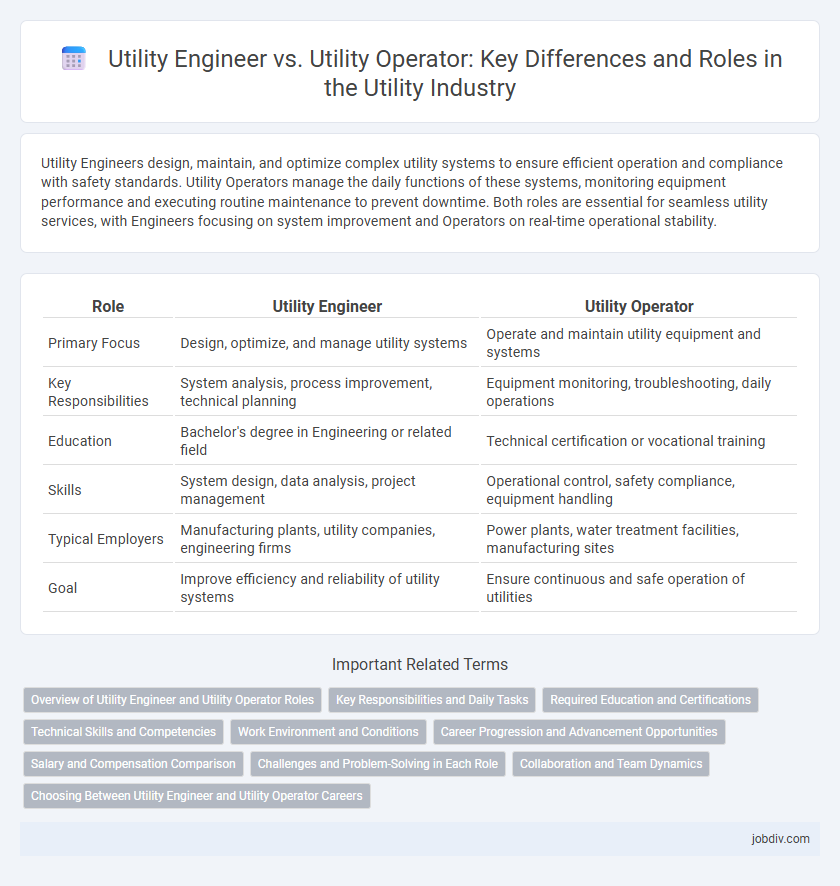Utility Engineers design, maintain, and optimize complex utility systems to ensure efficient operation and compliance with safety standards. Utility Operators manage the daily functions of these systems, monitoring equipment performance and executing routine maintenance to prevent downtime. Both roles are essential for seamless utility services, with Engineers focusing on system improvement and Operators on real-time operational stability.
Table of Comparison
| Role | Utility Engineer | Utility Operator |
|---|---|---|
| Primary Focus | Design, optimize, and manage utility systems | Operate and maintain utility equipment and systems |
| Key Responsibilities | System analysis, process improvement, technical planning | Equipment monitoring, troubleshooting, daily operations |
| Education | Bachelor's degree in Engineering or related field | Technical certification or vocational training |
| Skills | System design, data analysis, project management | Operational control, safety compliance, equipment handling |
| Typical Employers | Manufacturing plants, utility companies, engineering firms | Power plants, water treatment facilities, manufacturing sites |
| Goal | Improve efficiency and reliability of utility systems | Ensure continuous and safe operation of utilities |
Overview of Utility Engineer and Utility Operator Roles
Utility Engineers design, develop, and maintain complex utility systems such as water, gas, and electricity infrastructure, ensuring efficient operation and compliance with safety standards. Utility Operators control and monitor utility equipment and processes, performing routine inspections and troubleshooting to maintain system stability. Both roles collaborate to optimize utility services, with engineers focusing on system planning and operators handling day-to-day operations.
Key Responsibilities and Daily Tasks
Utility Engineers design, develop, and maintain utility systems such as water, gas, and electrical networks, focusing on optimizing efficiency and ensuring compliance with safety standards. Utility Operators manage the daily operation and monitoring of these systems, performing routine inspections, troubleshooting issues, and ensuring continuous service delivery. Both roles require collaboration to maintain infrastructure integrity, but engineers primarily handle planning and improvements, while operators focus on hands-on system management and immediate problem resolution.
Required Education and Certifications
Utility Engineers typically require a bachelor's degree in engineering disciplines such as electrical, mechanical, or civil engineering, along with professional certifications like the Professional Engineer (PE) license. Utility Operators, on the other hand, often need a high school diploma or associate degree combined with specialized operator certifications such as the Certified Distribution System Operator (CDSO) or state-specific utility operator licenses. Both roles demand ongoing training and certification renewals to comply with utility industry safety and regulatory standards.
Technical Skills and Competencies
Utility Engineers possess advanced technical skills in system design, automation, and predictive maintenance, enabling them to optimize utility infrastructure performance. Utility Operators specialize in real-time monitoring, control, and troubleshooting of utility systems, requiring strong competency in operational procedures and safety protocols. Both roles demand a deep understanding of utility regulations and the ability to interpret complex data to ensure efficient and reliable utility services.
Work Environment and Conditions
Utility Engineers typically work in office settings or on-site at infrastructure facilities, overseeing system designs, maintenance plans, and project implementations for utilities such as water, electricity, and gas. Utility Operators operate directly within field environments, managing and monitoring utility systems, performing routine inspections, and addressing operational issues under varying weather conditions. Both roles require adherence to safety protocols, but Utility Operators generally face more physically demanding and dynamic work environments.
Career Progression and Advancement Opportunities
Utility Engineers typically hold specialized technical qualifications and engage in designing, optimizing, and maintaining utility systems, positioning them for advanced roles in project management and system analysis. Utility Operators focus on the hands-on operation and maintenance of equipment, offering career growth through supervisory roles and hands-on expertise development. Progression from Utility Operator to Utility Engineer often requires further education and certification, enhancing opportunities for leadership and higher salary brackets within utility companies.
Salary and Compensation Comparison
Utility Engineers typically earn higher salaries than Utility Operators due to their specialized engineering skills and responsibilities, with average annual salaries ranging from $70,000 to $90,000. Utility Operators generally receive compensation between $45,000 and $60,000, reflecting their operational role and less technical scope. Benefits packages for Utility Engineers often include performance bonuses and advanced training opportunities, whereas Utility Operators may receive standard healthcare and overtime pay.
Challenges and Problem-Solving in Each Role
Utility Engineers face complex design and optimization challenges, focusing on system efficiency, reliability, and compliance with regulatory standards, requiring advanced technical knowledge and analytical problem-solving skills. Utility Operators tackle real-time operational issues, ensuring continuous system functionality by monitoring equipment performance and responding swiftly to outages or malfunctions, demanding quick decision-making and hands-on troubleshooting expertise. Both roles require strong collaboration but differ in problem-solving scope, with engineers addressing long-term improvements while operators manage immediate operational challenges.
Collaboration and Team Dynamics
Utility engineers and utility operators collaborate closely to ensure efficient management and operation of utility systems. Engineers provide technical expertise and design solutions, while operators manage daily operations and system monitoring, creating a dynamic workflow that enhances system reliability. Effective communication and teamwork between these roles are crucial for rapid problem-solving and continuous system optimization.
Choosing Between Utility Engineer and Utility Operator Careers
Utility Engineers design, implement, and maintain complex systems to optimize utility services such as water, electricity, and gas, requiring strong analytical skills and technical expertise in engineering principles. Utility Operators manage the daily operations and monitoring of utility systems, ensuring continuous service delivery and responding to operational issues with hands-on experience in system controls and maintenance. Choosing between these careers depends on whether one prefers a strategic, problem-solving engineering role or a practical, operational focus on system management and maintenance.
Utility Engineer vs Utility Operator Infographic

 jobdiv.com
jobdiv.com